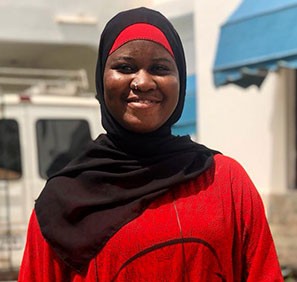FGM/C is a widely accepted cultural practice in the African continent and The Gambia is no exception. The abbreviated word stands for Female Genital Mutilation or Cutting, involving a process of partial or total removal of the external female genitalia for non-medical reasons. Other practitioners go beyond by closing the vulva, a process called infibulation, where a small hole is left for the passage of urine and menstrual fluid. The practice is rooted in gender inequality, attempts to control women’s sexuality, and ideas about purity, modesty, and beauty. It is usually initiated and carried out by traditional practitioners, who perceive it as a source of honour and fear that failing to have females cut will expose them to social exclusion. FGM is of four types: type I (partial or total removal of the clitoral glans), type II (partial or total removal of the clitoral glan plus the labia minora), type III (removal of the labia majora and sewn together, leaving a small hole for passage of urine and menstrual fluid), and type IV (includes all other harmful procedures, e.g., piercing, incising, scraping, etc. of the genital area). The practice is usually carried out days after birth or puberty using primitive and unsterilized blades, scissors, etc.
The practice is a deep-rooted culture in the country in which those who identify as traditional practitioners in their own communities typically carry out the activity under the supervision of no medical professional. Most of the female children are circumcised at a very young age, some of whom barely realize that they have been cut until they reach puberty. In many of the cases, those who believed themselves to be practitioners of FGM based it on the fact that it is a social norm and considered it a necessary part of raising a girl and a way to prepare her for adulthood and marriage. This can include controlling her sexuality to promote premarital virginity and marital fidelity, and others see it as a rite of passage.
According to the Gambia Demographic and Health Survey (GDHS), nearly 5 in 10 girls aged 0-14 in the country have undergone FGM while 4 in 10 girls were cut before age 5. Also, more than 7 in 10 women aged 15-49 have undergone FGM. Even though 89% of women and 65% of men know that FGM is illegal, this awareness level does not correlate with the decrease in the practice as there was a 10% increase in the practice from the 2019-20 survey compared to 2013 among age less than 5. FGM ranges from 48% in Banjul, the Capital city to 98% in Basse, the farthest administrative area.
FGM harms women’s physical and emotional health throughout their lives, starting from when their menstrual cycle begins during marriage to childbirth. The short- and long-term complications depend on the type of FGM, whether the practitioner has had medical training, and whether they used antibiotics or single-use surgical instruments.
Immediate complications can include severe pain, excessive bleeding, genital tissue swelling, infections (Tetanus), urinary problems, shock, and death while long-term complications can include urinary tract infections, painful menstruation, increased risk of maternal and newborn deaths because of prolonged labour, increased caesarean section rates, increased rates of episiotomy, perineal tears, and postpartum haemorrhage.
Despite all the negative health impacts FGM imposes on young girls and women, the Gambia is currently facing numerous challenges in the ban of the practice. FGM was outlawed in the Gambia in 2015, with only two cases prosecuted, and the first conviction was not made until August 2023. The debate began in late August last year when three women were convicted of FGM in the Central River Region. The first was prosecuted under the 2015 law and was ordered to pay a fine of 15,000 dalasis or spend a year in jail. Days later, one of the Islamic clerics paid the fine and encouraged Gambians to continue the practice, arguing that it is not just a merely inherited custom but also one of the virtues of Islam.
Instead of moving forward to implement this important law alongside other comprehensive policies to empower women and young girls, parliament is considering reversing it due to the reluctance from some religious groups and the traditional communities at large believing that the ban will result in forgoing the country’s cultural values. As the country is Muslim-dominant, some parliamentarians and religious leaders are threatening to introduce a bill to decriminalize the practice as the Supreme Islamic council has issued a statement condemning the practice to be denounced. Those who want to repeal the law have been very vocal and organized and were able to intimidate those opposing the law to be repealed.
The Gambia is a party to several international and regional conventions and treaties, such as the Convention on the Rights of the Child, the African Charter on the Rights and Welfare of the Child, and the Maputo Protocol. All these instruments have placed an obligation on the country to uphold the fundamental rights of women and girls and save them from any harmful traditional practices. Activists and other civil society organisations are also working tirelessly to denounce the practice, considering the various health impacts it poses. An open letter signed by 178 civil society groups urged the Gambian government to stand firm in its commitment to protecting the rights of women and young girls in the country. Also, the African Commission on Human and Peoples’ Rights, among others, made a robust response; a statement was issued by them expressing a deep concern about the regressive parliamentary debate on the issue at hand.
Many neighbouring countries are looking up to the Gambia as a source of inspiration, drawing valuable lessons from its progress, so repealing the law will not only be a great setback to the extensive efforts made in community awareness, social mobilisation, and advocacy against FGM but also jeopardise the health and wellbeing of children.
As FGM is a cultural practice, it will be quite challenging to get an agreement to stop it, as it has already taken years to get people to start changing their minds as regards the health implications it has. Continuous community engagement of religious leaders and traditional practitioners and having children who have undergone FGM speak about the effect it has on their health will be crucial in enhancing understanding among various groups, and with this, gradually banning it in communities will be much easier as well as help in passing the legislation.
About the Author:

Fatou W boye is pursuing Masters of Public Health (MPH)
